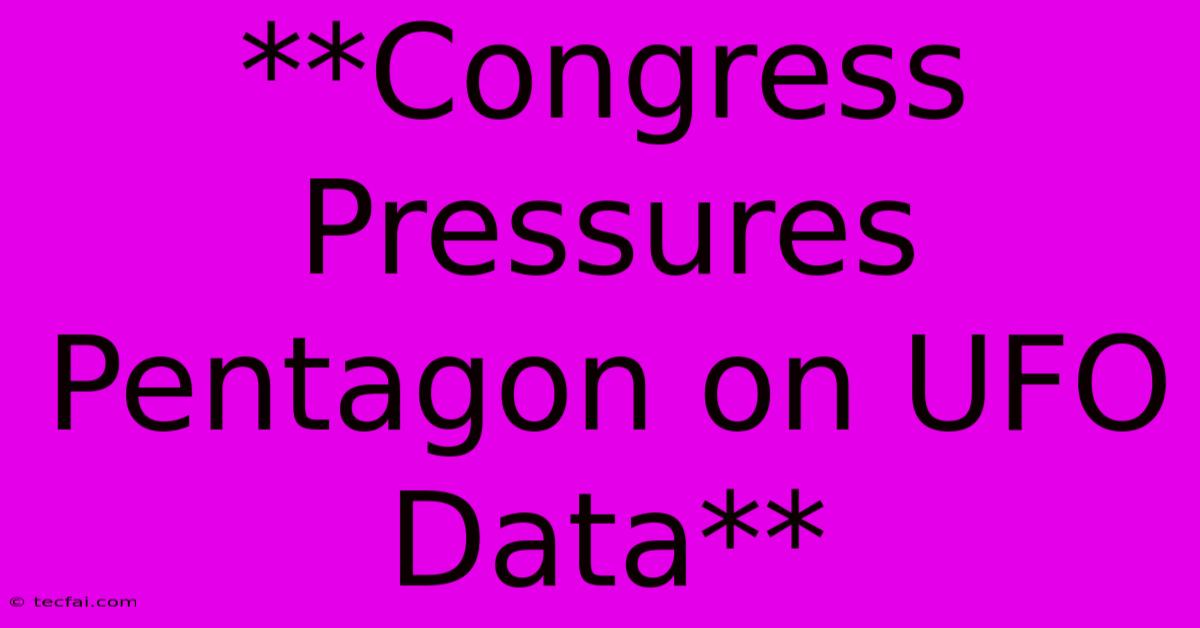**Congress Pressures Pentagon On UFO Data**

Discover more detailed and exciting information on our website. Click the link below to start your adventure: Visit Best Website tecfai.com. Don't miss out!
Table of Contents
Congress Pressures Pentagon on UFO Data: Unprecedented Scrutiny of UAPs
The United States Congress is intensifying its pressure on the Pentagon to release more information regarding Unidentified Aerial Phenomena (UAPs), formerly known as UFOs. This unprecedented level of scrutiny signals a significant shift in the government's approach to this long-debated topic, moving from hushed secrecy to a more transparent, albeit still cautious, investigation. The pressure is mounting, driven by public interest, growing concerns about national security, and a desire for accountability from lawmakers.
The Driving Forces Behind Congressional Scrutiny
Several factors have converged to propel this surge in congressional interest:
- Increased Public Awareness: Declassified government reports, coupled with increased media coverage and eyewitness accounts, have fueled public fascination and demand for transparency. This heightened public interest has directly influenced congressional action, pushing lawmakers to demand answers.
- National Security Implications: The potential threat posed by unidentified aircraft capable of exhibiting unusual flight characteristics is a major concern. Lawmakers are pushing for a thorough investigation to determine if these UAPs represent a technological advancement by a foreign adversary, a domestic threat, or something else entirely. Understanding the nature of these phenomena is crucial for maintaining national security.
- Lack of Transparency: Previous government investigations into UFOs have been shrouded in secrecy, leading to distrust and speculation. Congress is now demanding greater transparency and accountability from the Pentagon, seeking access to data and briefings previously withheld.
- Bipartisan Support: Notably, the push for greater transparency isn't limited to one political party. Both Republicans and Democrats are expressing concerns and demanding action, signaling a bipartisan commitment to addressing this issue. This broad-based support significantly strengthens the pressure on the Pentagon.
What Congress is Demanding
Congress is employing several strategies to pressure the Pentagon:
- Increased Funding: Allocating more funds for dedicated UAP research and investigation is a key tactic. This demonstrates a commitment to addressing the issue seriously and provides resources for a more in-depth analysis.
- Mandatory Reporting: Legislation is being considered to mandate more comprehensive reporting of UAP sightings by military personnel and other relevant agencies. This aims to build a more complete and reliable dataset for analysis.
- Public Hearings: Holding public hearings on the topic allows lawmakers to directly question Pentagon officials and experts, ensuring public accountability and transparency. These hearings offer a platform for disseminating information and addressing public concerns.
- Data Access: Congress is actively seeking access to classified data related to UAP sightings and investigations. This includes not only visual and radar data but also potentially other intelligence gathered from various sources.
The Pentagon's Response and the Road Ahead
The Pentagon's response to this increased pressure has been a mix of cooperation and resistance. While some information has been released, significant portions remain classified, citing national security concerns. The ongoing debate highlights the challenges of balancing transparency with the need to protect sensitive information.
The coming months and years will be critical in determining the ultimate outcome. The level of cooperation from the Pentagon, the willingness of Congress to push for greater transparency, and the evolution of public opinion will all play a significant role in shaping the future of UAP investigations. The path forward remains uncertain, but the current pressure from Congress represents a significant turning point in the long history of government investigations into unidentified aerial phenomena. This is a story unfolding in real-time, and the demand for answers is only growing louder.
Keywords: UFO, UAP, Unidentified Aerial Phenomena, Congress, Pentagon, National Security, Transparency, Government investigation, Military, Public Hearings, Classified Information, Bipartisan Support, Data Release.

Thank you for visiting our website wich cover about **Congress Pressures Pentagon On UFO Data** . We hope the information provided has been useful to you. Feel free to contact us if you have any questions or need further assistance. See you next time and dont miss to bookmark.
Featured Posts
-
First Look 4m Lake Home
Nov 15, 2024
-
Enter To Win A 4 Million Lake District Home
Nov 15, 2024
-
Paraguay Vs Argentina How To Watch
Nov 15, 2024
-
England Vs Greece Live Updates And Result
Nov 15, 2024
-
Watch Venezuela Vs Brazil 2026 Qualifiers
Nov 15, 2024
